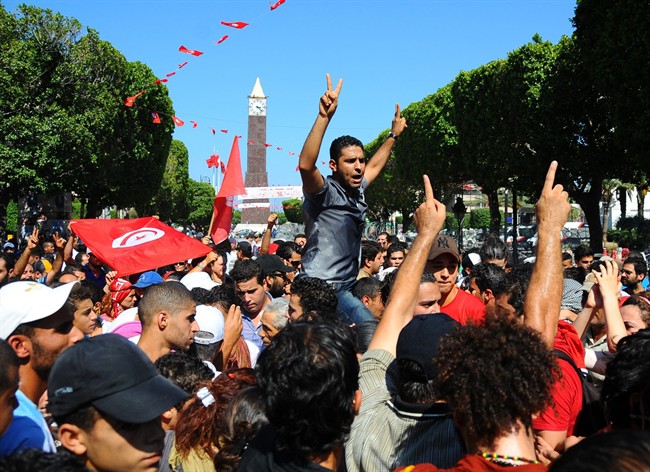TUNIS, Tunisia – Thousands of Tunisians marched through their capital on Saturday, calling for the Islamist-led government to resign as the nation’s political crisis deepens.

The assassination of an opposition politician in July, the second in six months, has sharply polarized the country and prompted a walkout by some 60 opposition assembly members.
The march was the culmination of a week of protests organized by a coalition of opposition groups known as the National Salvation Front, calling for the resignation of the government and the dissolution of the assembly elected in 2011 to write the constitution.
Tunisians overthrew their dictator in January 2011, kicking off pro-democracy demonstrations of the Arab Spring around the region and beginning a difficult transition to democracy.
“The government must fall,” chanted the crowd that marched some three kilometres (about a mile) from the parliament building to the seat of the government in the centre of the city known as the Kasbah. The opposition accuses the Islamists of failing to ensure security in the country or improve the economy.
“Ali Larayedh, the Tunisian people will not be humiliated” they said, addressing the prime minister, who is part of the moderate Islamist Ennahda party that is the dominant coalition partner in the government.
The crowd, which included a large proportion of women and young people, waved red-and-white Tunisian flags and carried signs holding the Islamists responsible for the assassinations of two left-wing politicians.
“The campaign for the departure of the government is far from over. We will put together a plan of action for next week to increase the pressure until our legitimate demands are met,” said Khemais Ksela, an opposition deputy.
The government has blamed the assassinations on Islamist extremists and has offered a roadmap to finish the constitution and hold legislative and presidential elections. It has also offered to dissolve itself and form a non-partisan government to oversee elections once the constitution is written. But opposition parties have insisted that the government be dissolved immediately as a condition of negotiations.
Talks are being mediated by the country’s powerful main labour union. While there has been no breakthrough yet, members of the two sides have hinted at possible compromises over the past week.
Unlike in Egypt, where a military coup toppled an elected Islamist government, Tunisia’s transition has been marked by a pattern of compromises between political actors that has kept the process on track.



Comments